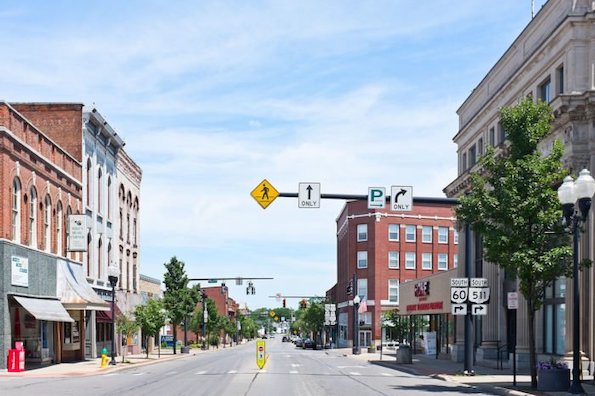Hi Friend
I was born and raised in the small town of Ashland, Ohio. It had 20,000 residents, a college (now university) one high school, one junior high and a handful of elementary schools. There was a movie theater in town that had been converted from one big screen to three separate screens. There were two parks, Brookside and Khan Grove. There was one arcade, under the Little Caesars on Claremont (I dominated Pac-Man and Donkey Kong). There were two bowling alleys, Kings lane and Luray lanes. There was one McDonalds.
I knew two black people. Both of them went to my church. Columbus was one year older than me and Brian was one year younger. My graduating class of just over 300 was entirely caucasian. I recall one other black student, Jessie but he also was a year older than me. (Disclaimer: I don’t trust my memory to be 100% accurate)

Not surprisingly, race wasn’t much of an issue. Though the town had a fair share of what would be considered “rednecks” I wasn’t exposed to overt racism or even negative attitudes towards people of color (that I recall). Probably because there wasn’t a lot to prompt those kinds of conversations. When we talked of American history, from slavery to Abe Lincoln to MLK Jr., it seemed like an era that had passed.
I didn’t know.
The first year I lived in OKC my white friend Troy and I started an outreach to a low income apartment complex on 10th street. Every Thursday night we’d spend a couple of hours in that community. It was entirely black families. I was 21 years old. I learned names I’d never heard before. I witnessed a different approach to mothering that was intimidating, humorous, passionate and powerful. I became aware of the complexity of decision-making when living in poverty.
I didn’t know.
The next year, 1992 I lived with two roommates – one black, Tim, one white, Kent. Tim played saxophone at church and I ran sound. We drove together every Sunday morning. We talked about his big family, our hopes and dreams for the future and our current aspirations. I don’t recall ever discussing race. Was that even appropriate? Necessary?
I didn’t know.
In the almost 30 years since those days, I’ve always had people of color in my life. Some closer than others. On a handful of occasions I recall discussing race with them in context of events happening in society. Only with one good friend Chris did I intentionally question about “being black.” We both worked with students and I wanted to understand better. He shared insights about heritage, generational transfer of mindsets, attitudes & beliefs, societal status history and its relevance today.
I didn’t know.
My wife has been known to say to me “I don’t understand how you could do X?” or “I don’t understand why you won’t do Y?” In rare, brave moments I’ll say “OK. Well at least you admit you don’t understand.” 😝 But that’s NOT what she’s saying. What she really means is EXPLAIN YOURSELF! And don’t just explain it, but offer it in a way that makes sense to her AND seems reasonable. Otherwise…
She’s not unique in that quest. When we don’t understand we want someone to satisfy our lack of knowledge, curiosity or sense of right. We obligate the person of difference. It’s their responsibility to justify their divergent action, or we’ll happily categorize them as “wrong”.
Understanding doesn’t require agreement but it does threaten our own sense of security in the way we see ourselves.
Understanding doesn’t make someone right or wrong, but it is the only way justice can prevail.
Understanding can implicate our ignorance as collusion even if unintentional.
Understanding enables empathy and compassion.
What I do know:
Positioning to pause and listen is vitally necessary.
Exempting ourselves is tempting, but ironically incriminating.
Asking awkward questions is OK.
Believing without understanding is a legitimate option.
Learning changes us!
There is still plenty to grasp…
I didn’t know systematic casual brutality was a thing. It’s repulsive.
I didn’t know living with inherent daily fear was legitimate. It’s shocking.
I didn’t know my normal was a privilege. It’s humbling.
Instigating Ideas:
- Watch or Listen to something about Black History.
- Talk to a person of color concerning their thoughts about current events.
- Explore where you might have a blindspot about yourself when it comes to race.
I’ve seen the references to #BlackLivesMatter in comparison to love, buildings, countries, etc. Also the Biblical account of the shepherd leaving the 99 to go after the one. The lesson implied is that focusing on one doesn’t diminish from the many. For you and me, it’s important to extract WHO is doing the focusing. It’s not the 99 going after the one sheep. It’s the One who loves each individual sheep.
Our challenge is caring. Do we genuinely care for others? We’ve reached the apex of societal fury because it hasn’t been on our radar in a way that compelled us to care.
I didn’t know I didn’t care. Do you?
I dare you to discover something you didn’t know that you didn’t know about race relations this week. I would love to hear what you learn. Please share.